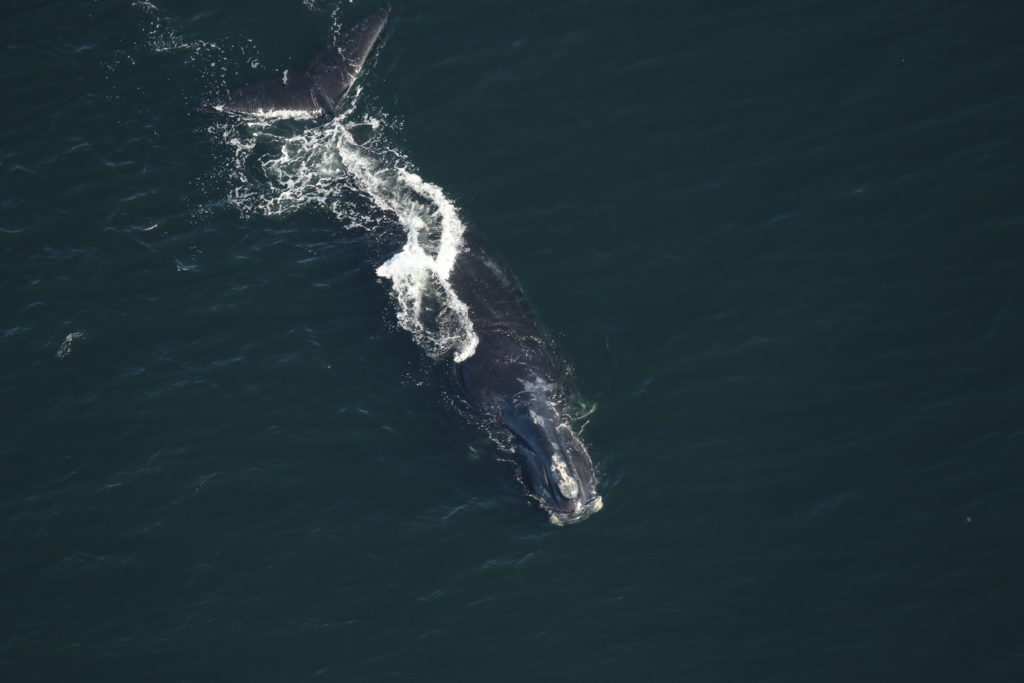
December 2, 2020 (WASHINGTON) — Conservation and wildlife-protection groups today filed an emergency rulemaking petition to protect critically endangered North Atlantic right whales from becoming entangled in commercial fishing gear.
“North Atlantic right whales are in crisis, and these critically endangered animals need protection from deadly entanglements now,” said Kristen Monsell, oceans legal director at the Center for Biological Diversity. “Federal officials need to immediately prohibit the use of vertical fishing lines in the whales’ important habitat areas.”
New scientific information shows the population now consists of 356 animals, only about 70 of whom are breeding females. The species has suffered nearly a 25% population loss in less than a decade. Entanglements are the leading cause of skyrocketing rates of right whale deaths and serious injuries and are also preventing them from reproducing, pushing calving rates to historic lows.
“At least 32 right whales have been killed by human activities in the last three years alone, yet the federal government is still sitting on its hands,” said Erica Fuller a senior attorney at the Conservation Law Foundation. “The window to save this species is closing, and we’re left with no other option but to file this petition. The federal government must declare this situation what it is – an emergency – and take action to protect these animals now.”
The petition asks the National Marine Fisheries Service to find that entanglements in the vertical buoy lines used in commercial fisheries are having an immediate and significant adverse impact on right whales and to issue emergency regulations to address that impact. This includes closing waters off Southern New England to trap/pot and gillnet gear.
It also requests that the agency allow the use of on-demand fishing gear (also known as ropeless or pop-up buoy gear) during the emergency closures. These new technologies eliminate the vertical buoy lines that are so dangerous to right whales while allowing fishing to continue.
“Four out of every five North Atlantic right whales has suffered from entanglement at least once,” said Jane Davenport, a senior attorney at Defenders of Wildlife. “Yet the government refuses to act as an entire species teeters on the brink of extinction. We must give these whales some breathing room in the areas where they feed and mate, oblivious to the dense maze of entangling fishing lines surrounding them.”
The Center for Biological Diversity, Conservation Law Foundation, and Defenders of Wildlife were among the groups that filed the emergency petition under the Marine Mammal Protection Act and Administrative Procedure Act.
In April 2020 the petitioners won a lawsuit challenging the Fisheries Service’s management of the American lobster fishery for failing to protect endangered right whales from entanglements. The agency has until May 31, 2021 to issue new regulations to reduce entanglement risk. But in the meantime, there are no new mitigation measures in place. The petition seeks to ensure additional protections are in place while the Service develops long-term regulations.
The Center for Biological Diversity is a national, nonprofit conservation organization with more than 1.7 million members and online activists dedicated to the protection of endangered species and wild places.
Conservation Law Foundation is a regional, nonprofit organization that protects New England’s environment for the benefit of all people. We use the law, science, and the market to create solutions that preserve our natural resources, build healthy communities, and sustain a vibrant economy.
Defenders of Wildlife is dedicated to the protection of all native animals and plants in their natural communities. With over 1.8 million members and activists, Defenders of Wildlife is a leading advocate for innovative solutions to safeguard our wildlife heritage for generations to come. For more information, visit Defenders.org/newsroom and follow us on Twitter @Defenders.
###
